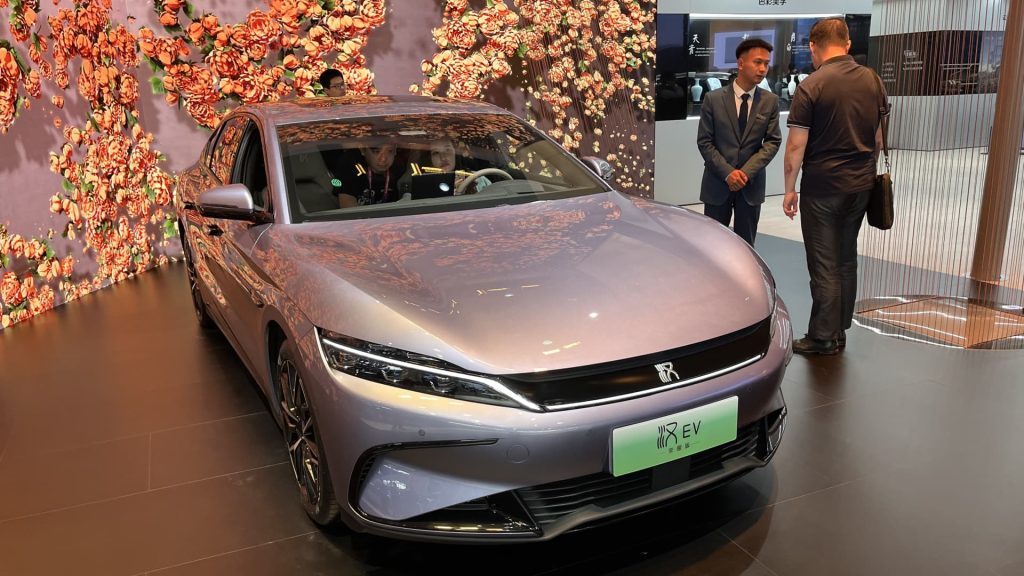Winning the Chinese EV market is no longer about getting the lowest price. Despite the new US tariffs, China’s electric vehicle industry is already moving into a new phase of competition that will no longer focus solely on fixed prices, many in the industry say. This is good news for profits. But it also forces companies to make sure they spend money on developing the features that consumers want. Sometimes this can be as simple as installing a sunroof, while benefiting glass manufacturers. More than 80% of Chinese consumers surveyed by JPMorgan last month said they prefer an electric vehicle with a panoramic sunroof, and most are willing to pay more than 600 yuan ($84.50) to get one. Untapped Market When it comes to these extensive panels, the market is largely untapped. Only about 12% of the world’s cars, including traditional fuel-powered vehicles, have a panoramic sunroof, JPMorgan analysts said in a report last week, citing data from Fuyao Glass through the end of 2023. Hong Kong-listed Fuyao, a major automotive glass supplier, is one of JPMorgan’s top picks to capitalize on China’s growing electric vehicle market. Panoramic sunroofs accounted for about 7% of Fuyao’s total revenue in 2023, the report said. JPMorgan and a survey partner surveyed more than 2,500 consumers in China who had recently bought or were planning to buy a new electric vehicle in mid-April. “We believe Chinese EV competition has moved from a focus on ‘price’ to now increasingly ‘content’ and, surprisingly, our survey results show that customers are willing to pay for content,” JPMorgan said. This is in line with a survey by consulting firm AlixPartners, which found that consumers in the US and Europe are more price sensitive than Chinese consumers when it comes to buying an electric vehicle. “We don’t interpret this to mean that Chinese consumers are not price sensitive,” said Stephen Dyer, co-head of Greater China business at consulting firm AlixPartners and an Asia leader in automotive and industrial practice. “We interpret this to mean that there are already literally hundreds of reasonably priced options for Chinese consumers. They’re well priced,” he said in late April, noting that Chinese consumers place nearly twice as much importance on technical features as U.S. respondents. That interest was on full display at the Beijing auto show late last month, with nearly every electric vehicle manufacturer highlighting driver assistance and in-car entertainment capabilities. But the core technology of electric vehicles remains the battery. About 70% of respondents to the JPMorgan survey said they were willing to pay more for their desired battery brand, especially those that offer supercharging. “This is positive for CATL, which is now 1-1.5 years ahead of its competitors in terms of launch [a] ultra-fast battery charging,” analysts say. Chinese battery giant Contemporary Amperex Technology, listed in Shenzhen, is one of the leading companies in the Chinese electric vehicle supply chain, owned by JPMorgan. Hybrids are popular. Of course, not every Chinese car buyer is ready to go purely electric. However, the latest JPMorgan survey found a significant increase this year in the number of respondents preferring hybrid vehicles over battery-only vehicles. Some 44% of those surveyed said they would prefer to buy a plug-in hybrid or a fuel-powered vehicle. Increased battery range. That figure increased from 27% in 2023 and 24% in 2022, JPMorgan said in a report. In terms of automobile brands, BYD has ranked first in popularity among consumers over the past three years, the report said. The electric vehicle manufacturer and giant makes both hybrid and battery-powered vehicles and is one of JPMorgan’s top players in the sector. BYD lost some brand recognition compared to last year’s results, with new entrant Xiaomi Geely’s Huawei brand Aito and Li coming in second place. A JPMorgan report said automobiles were among the brands that experienced significant increases in customer acceptance. Tesla’s brand strength has decreased slightly. However, the study found that the Tesla Model 3 was the most desirable battery-powered car in the RMB 200,000 to RMB 300,000 price range. The majority of JPMorgan survey respondents budgeted at least 300,000 yuan for a car purchase, with the 300,000 to 400,000 yuan range being the most popular. Last week, Chinese electric vehicle company Nio launched a new car at a lower price of just over 200,000 yuan. Although the new Onvo L60 SUV is about $4,000 cheaper than the Tesla Model Y, the car is slightly more expensive than Xiaomi’s new SU7 electric sedan. Nio CEO William Lee told reporters on Thursday that he expects the electric vehicle price war in China to be largely over, with most of the cuts already made. — CNBC’s Michael Bloom contributed to this report.
China’s hot EV market is no longer focused on lower prices. Stocks to watch
No Comments4 Mins Read


